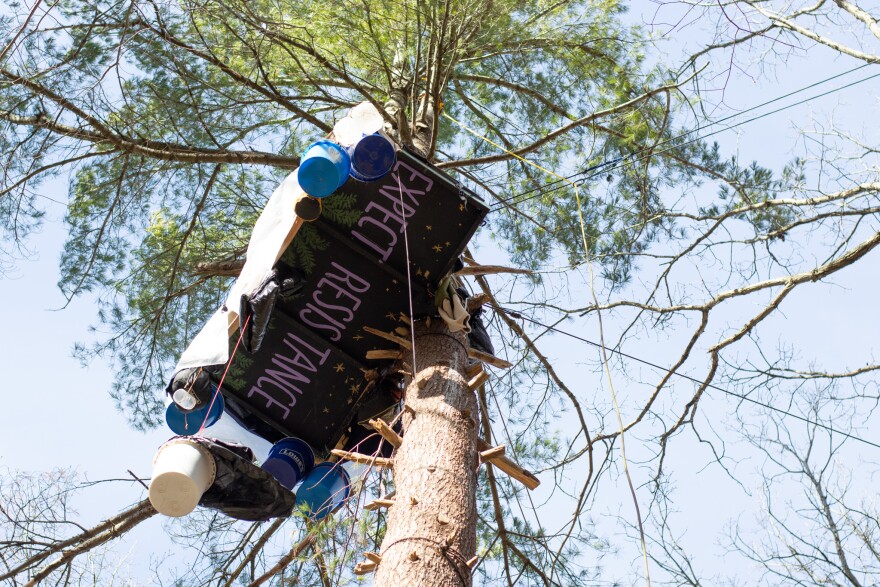In the wake of a controversial Senate deal involving the Mountain Valley Pipeline, Senators Kaine and Warner reintroduced the Pipeline Fairness, Transparency, and Responsible Development Act. WMRA's Randi B. Hagi reports.
Last Thursday, Kaine and Warner proposed a bill that aims to give local communities and landowners more input on natural gas, also known as fracked-gas pipelines. Specifically, it cracks down on how the Federal Energy Regulatory Commission, or FERC [ferck], goes about approving interstate pipeline projects.

MARK WARNER: One of the things we saw with the Mountain Valley Pipeline process was that the ability to have public comment was, I think, FERC kind of mishandled some of that.
Sen. Mark Warner spoke about the legislation in a press conference on Wednesday. The bill was first introduced in 2020, but died without being voted on.
WARNER: So what Tim Kaine and I have done is we've laid out a piece of legislation – not sure it'll get enacted – that would say we need to be clear about public input, number one. Number two, in terms of Mountain Valley, I know there's been a lot of discussion about permitting reform and some of the deal that may have been struck between Sen. Manchin and Sen. Schumer that included Mountain Valley. I've not seen any of the details on that, so I'm not going to weigh in on that at this point.
Warner is referring to the deal that got West Virginia Sen. Joe Manchin on board with the Democrats' major climate change bill back in August. According to a document from Manchin's office published by ProPublica, the deal includes a variety of changes to how the federal government oversees permits for new energy projects – and very simply states, "complete the Mountain Valley Pipeline."

Based on a progress map that the Mountain Valley Pipeline – or MVP – website last updated in December, the majority of the work yet to be completed is on the Virginia side of the route through southwestern Virginia.
Residents throughout the Appalachian region who have been affected by MVP and other pipelines rallied in Washington, D.C. on September 8th against what they call "Manchin's dirty deal."
Environmentalists, and many landowners, oppose the MVP's use of eminent domain to seize privately owned land. That became national news in 2018, when Theresa "Red" Terry spent weeks in a tree sit on an area of her family's land southwest of Roanoke that was claimed by the builders.
[birdcalls, sound of the wind]
Tree-sitters then blockaded construction near Yellow Finch Lane in Montgomery County for two-and-a-half years, by continuously occupying small platforms established five stories above the ground. A group of supporting volunteers eked out a camp below them.
[laughter, guitar]
ACTIVISTS SINGING: So when you think MVP, think of us sitting in a tree, trying our best to be free. This pipeline will never be …
As The Appalachian Voice reported, the last tree-sitter was removed from the Yellow Finch blockade in April of 2021.

Challenges have come from legal rulings as well. The 4th U.S. Circuit Court of Appeals has repeatedly halted the pipeline's construction. ProPublica notes that the court has ruled that the U.S. Forest Service, the Army Corps of Engineers and the Bureau of Land Management all illegally approved different parts of the project. Included in Manchin's edict is the note that any further litigation against the pipeline would be moved out of that jurisdiction – and instead be handled by the D.C. Circuit.
DAVID SLIGH: He wants to push for final approval of the Mountain Valley Pipeline. That is after eight years, that's after they've lost federal permit after federal permit because they just weren't legal, and now he wants to basically jump over all those processes.
David Sligh is the conservation director of Wild Virginia, a Charlottesville-based nonprofit dedicated to protecting wild places. He noted that Kaine and Warner's proposed legislation likely comes too late to affect the fate of the Mountain Valley Pipeline, although if it passed, and if a currently pending court challenge caused the project to be reviewed by FERC again –

SLIGH: … then maybe some of these aspects of this bill would help.
We walked through some of the major points of the proposed legislation. For one, FERC would have to make sure that the companies appropriately notify potentially affected landowners, and conduct public comment meetings in every locality where a pipeline would pass through.
Additionally, the builders would not be able to exercise eminent domain until the project has gotten all of its federal permits in order, and all landowner appeals have been ruled upon.
SLIGH: You know, the idea is supposedly that eminent domain is applied when it's for the public good, and the fact is that that's not necessarily the case with these pipelines. And so that in itself should be corrected, and I think this bill attempts to do that.
For now, it remains to be seen whether Kaine and Warner's changes to FERC will be passed or even entertained by Congress, as well as how exactly Manchin will draft legislation to try and achieve his goals.


